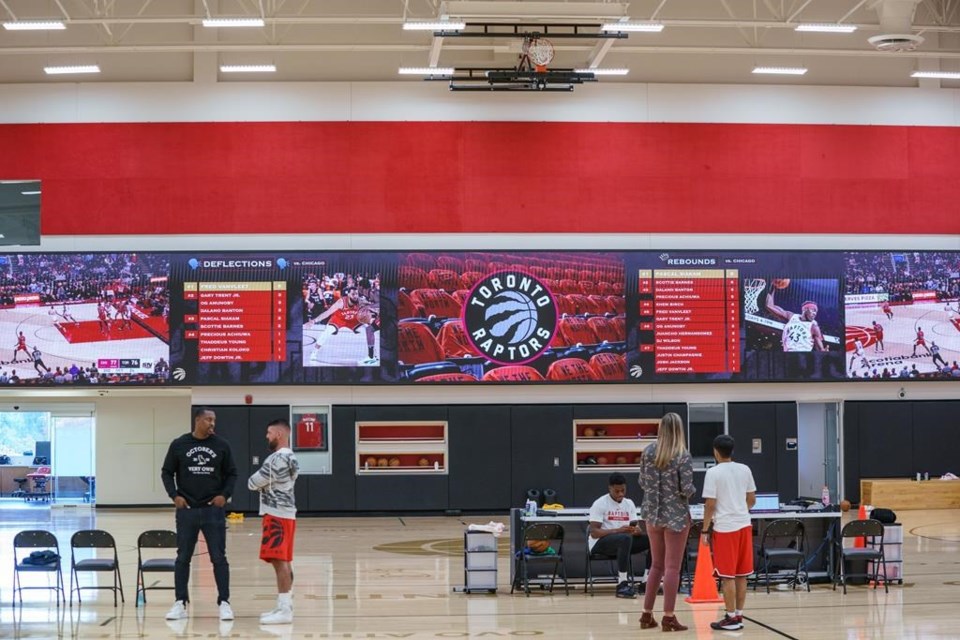TORONTO — Back in the day, a basketball player might sneak into a gym to work on his shot late at night.
Now a Toronto Raptor can do it and have a machine verbally and visually track his shot. And then file it away for future comparison.
The NBA franchise showed off its new multimedia analytic board Tuesday, a giant screen that stretches 37 metres long and three metres high on a wall alongside one of its practice courts at the OVO Athletic Centre.
Comprised of 448 video boards, the massive screen — which required a steel beam to be installed for support — is able to show game or practice footage as well as next-level stats. And thanks to face recognition and eight cameras mounted above each basket, it can track and document a player's shooting motion, even voicing the numerical arc, depth or straightness of a shot.
"My original thought was that we could have a Jumbotron courtside so that we could be doing things in practice and want to teach immediately," said Raptors coach Nick Nurse. "So we could stop it, say 'Rewind it. We want to look at that play again.' And teach and coach immediately on the spot."
That original idea soon mushroomed.
The Toronto brain trust wasted little time coming up with other material to add to the technological pipeline. On Tuesday, the board showed the shot data from Noah Basketball dubbed Noahlytics, which uses computer-vision technology and proprietary algorithms.
For the players, it's an immediate evaluation of their shot.
"If they missed it, they can see why," said Nurse who is on Noah Basketball's board of directors. "If it was too far to the left, if it was too long, it was too short, (the) arc was too flat, Whatever."
The screen also showed rebounding and deflection statistics from the Raptors' last outing, plus other information gleaned from the league. It can also be used for "special messaging," from goals to mantras.
"I kind of wondered what else I might use it for at the beginning," Nurse said with a laugh. "But yes, we're finding we've got a lot of things to use it for."
"Now we seem like we have so many ideas we may need another one on this side." he said with a smile, pointing at a bare wall.
Nurse used the screen recently in reinforcing the need for having a player "run to the rim."
"We pulled out all the clips from last year where that happened and a guy got a layup or a dunk and we just let it roll. And then we started all the drill work emphasizing that as that was rolling (on the screen). And we did it for about three or four days, early before practice started."
For the players, it was tangible proof of the reason behind the drill.
Veteran Raptors forward Thaddeus Young, who entered the league in 2007, says the players like the board — for a concrete reason.
"We all want to become better shooters … You're getting real-life analytics and stats, real-time data that's helping you as a player get better each and every day," he said.
The information from Noah has proved to be a good fit for the board. Previously that data would have to be located then printed out to show to a player via iPad, paper or perhaps text.
"Everybody's moving pretty fast around here during a season so it's nice to get the immediate teaching up there (on the board)," said Nurse.
Humza Teherany, chief technology and digital officer at Maple Leaf Sports and Entertainment, ultimately sees the board as a way to deliver information "tailored the way coach Nurse would want to see it, tailored the way he would want players to see it."
And, most importantly, the hope is that leveraging data and technology will pay off on the court.
"In our quest for championships, we want to support better, faster decision-making," said Teherany. "And that's really the intent of it. You're seeing a version of it now. I think we keep on building on top of it, looking at the learnings, making it even more impactful as we go, as we get more and more experience with it
"But the basics of what it does, I think is going to be foundational to really advance uses of it in the future as well."
Other teams may have similar information available via iPads or computers, he said. "But not in the integrated way that we're looking at it."
Teherany believes the technology could also be used at MLSE's other teams.
The Raptors have a full-time research, development and analytics team. And during practice, staff is on hand to switch videos as needed or match it with data that might track ball rotation where the ball enters the rim or how fast the ball's release was.
The Raptors open the NBA season Oct. 19 at home to the Cleveland Cavaliers.
---
Follow @NeilMDavidson on Twitter
This report by The Canadian Press was first published Oct. 11, 2022
Neil Davidson, The Canadian Press


